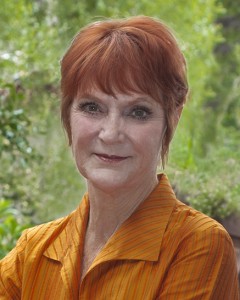Meet Dr. Pat Love. It’s impossible to encapsulate Pat in a few sentences, or to fully showcase her expertise in one blog post, so we’ve chosen to glean her knowledge on transitioning your sexual relationship through the addition of a new baby to your family. You’ve likely seen Pat on TV and run across her articles in popular magazines, but she’s also a distinguished professor, licensed marriage and family therapist and long-standing clinical member/approved supervisor for the American Association for Marriage and Family Therapists. Pat has authored/co-authored numerous articles and six books, including Hot Monogamy and How to Improve Your Marriage Without Talking About It. She’s a popular national and international presenter, trainer and relationship consultant, but most of all, after 30 years she simply enjoys being a helper. I first heard Pat being interviewed on a radio talk show, and mid-way realized I was shouting out loud, “Yes!!! Me toooo!” When I’m yelling at a tiny clock radio in an empty bathroom, I’m pretty sure I’m in the presence of wisdom.
BPP: What drew you to specializing in relationships and intimacy issues?
PL: I am a life-long learner, and the drive to learn led me to research and study relationships. I had a lot to learn personally about love, intimacy, sexuality and parenting, and the more I learned along the way, the more I was able to pass this knowledge on to my clients as well as others in the helping professions. Because relationships are more difficult in the 21st century, the challenge of helping families and couples keeps me energized and excited. I am very grateful for meaningful work and the practical knowledge I’ve been able to pass on to others. It’s an exciting time to be a relationship consultant!
BPP: What are common sexual intimacy issues you see in couples who have added a new baby to the family?
PL: Pure exhaustion has to be the number one issue. The 24/7 responsibility cannot be explained to anyone who has not experienced it. Sleep deprivation, worry, time pressure and caregiver-overwhelm—all create a form of stress unlike any other. Oddly, this type of strain makes half the population want sex more and the other half of the population want sex less (Uh, what would be below wanting it less? Unconscionable? Out of the realm of possibility? Infuriating? Seriously?). A typical couple has one person from each category so you do the math. Desire discrepancy is the norm in most couples, but it becomes exacerbated during the first couple of parenthood years. This “I’m Hot and You’re Not Syndrome” can cause stress and compassion fatigue in couples.
Another fact not given enough attention is that new moms don’t get their normal libido back for at least a year after the baby’s birth, and even longer with breast feeding. This is Nature’s way of getting you to focus on this baby instead of making another one. Women may need to be more proactive when it comes to creating sexual desire, possibly a new experience not required before.
Another issue: the role of providing post-partum help and assistance to the mom. It is imperative for the partner to understand that help and support is directly tied to the mother’s sex drive. A partner who does not help is providing a strong sexual disincentive to the mother! Whatever is more powerful than a “turnoff” —use that word here to describe how it feels to be expected to be sexual when your partner is not helping or sensitive to the need for help.
One more thought: a new baby changes the family constellation and the roles the partners personify. When it’s just the two of you, all your discretionary time can be lavished on one another. Plus, the expectations are unified around the role of partner, best friend, confidant, sexual partner. When baby arrives, all of the sudden you are Mom and Dad, not just lovers and spouses. Whole new ball game. You are now sharing your time, energy and attention with another person who is by nature very demanding and determined to be the priority.
If the new baby isn’t your first, the issues mentioned above are still relevant because two, or three or four children take more time than one.
BPP: What is the average time frame in which a new mom could expect to feel her libido return to normal, and what are the factors that reduce a woman’s sex-drive after giving birth?
PL: This depends upon how long you’ve been in the relationship; how much personal knowledge you have about your own arousal/desire style; and your desire level prior to the pregnancy. For most women, the libido fully returns in about a year or after breast feeding has ceased. Medications and hormones can obviously change this. Women with a naturally high libido can see a return sooner.
BPP: What advice would you offer a new mom who is physically able to resume her sexual relationship, but can’t seem to get into the mood?
PL: First and foremost, honor yourself for sharing this normal experience with millions of women around the world! Second, let your imagination run wild and fantasize about what would excite you (not just sexually, but what would excite you period!). If your answer is something like, “A month of restful sleep,” then so be it. Negotiate from this point.
Post-partum turn-ons are likely very different than before. Be brave in voicing your needs and desires. If you need some of the pampering the baby is getting, then put it in positive, measureable and specific (you can remember the acronym PMS) terms for your partner to lavish on you. Examples: “For the next full week, let me sleep through the night while you get up with the baby.” “Take care of dinner through the end of this month.” “Ask your mom to bring dinner over once a week.” “Take care of the baby for one hour in the evening while I have some time to myself.”
BPP: What advice/perspective would you offer fathers/parenting partners who are feeling frustrated with the lack of post-baby physical intimacy?
First, do everything in your power to lower your partner’s stress; this is post-partum foreplay! Second, be as patient as possible in the first three months. Third, be clear about your sexual needs; make sure you are voicing your desire in a kind, clear manner. Lavish each other with S.O.S., skin-on-skin contact. It’s not just the baby who needs affection and caregiving! Don’t hesitate to seek guidance from good books, sites and support.
BPP: What are ways expectant couples can prepare proactively mentally/emotionally for the possible changes in their post-baby sexual relationship?
PL: Read, learn, talk to others who have done it successfully. Make sure your communication skills are exceptional; couples who can stay connected through this time are the happiest. Prioritize tasks and make sure your relationship is on the list. Some things you can let go for years (a neat garage or the perfect yard); others have to be made vital.
BPP: What do you find yourself saying over and over to new moms about their sexual relationships? New dads/parenting partners?
PL: Partnering is the primary part of parenting!
BPP: What are ways new parents can remain close intimately during the first 6 weeks after giving birth, when sex is off limits, and both parents are exhausted?
PL: Holding each other while you hold the baby. Lots of S.O.S. (skin-on-skin) with one another. Sleeping and napping together. Keeping chores to a minimum. Let others help. Ask for help so you can enjoy each other as well as the baby. Buy sleep, rest and fun via hiring out to get chores done. When others offer help, let them do the jobs that will enable you two to spend time together and with the baby.
BPP: If you had to give one sanity-saving tip to new parents, what would it be?
PL: Buy more underwear—you won’t have to worry about doing laundry for yourself that way.
Thank you Pat, for your accessible suggestions and guardianship of couples! We value your work and are grateful for your contribution to our BPP volume of wisdom. And, we can’t resist this opportunity to note the sheer perfection of your last name.
C & K ♥






Leave a Reply